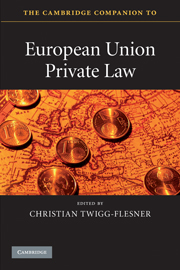Book contents
- Frontmatter
- Contents
- Preface
- List of Contributors
- Table of cases
- Table of legislation
- 1 Introduction
- 2 The historical evolution of European private law
- 3 European private law and the comparative method
- 4 The role of the conflict of laws in European private law
- 5 Competence and European private law
- 6 Language and terminology
- 7 European private law by directives
- 8 The European Court of Justice as a motor of private law
- 9 European contract law
- 10 The way forward in European consumer contract law
- 11 Commercial contracts and European private law
- 12 European tort law
- 13 European Union property law
- 14 Information obligations and withdrawal rights
- 15 Travel law
- 16 Unfair contract terms
- 17 Unfair commercial practices and European private law
- 18 Consumer sales and associated guarantees
- 19 Product liability
- 20 Commercial agency in European Union private law
- 21 EU competition law and European private law
- 22 Non-discrimination and European private law
- 23 Financial services in European Union private law
- Further reading
- Index
19 - Product liability
Published online by Cambridge University Press: 05 July 2015
- Frontmatter
- Contents
- Preface
- List of Contributors
- Table of cases
- Table of legislation
- 1 Introduction
- 2 The historical evolution of European private law
- 3 European private law and the comparative method
- 4 The role of the conflict of laws in European private law
- 5 Competence and European private law
- 6 Language and terminology
- 7 European private law by directives
- 8 The European Court of Justice as a motor of private law
- 9 European contract law
- 10 The way forward in European consumer contract law
- 11 Commercial contracts and European private law
- 12 European tort law
- 13 European Union property law
- 14 Information obligations and withdrawal rights
- 15 Travel law
- 16 Unfair contract terms
- 17 Unfair commercial practices and European private law
- 18 Consumer sales and associated guarantees
- 19 Product liability
- 20 Commercial agency in European Union private law
- 21 EU competition law and European private law
- 22 Non-discrimination and European private law
- 23 Financial services in European Union private law
- Further reading
- Index
Summary
Overview
Product liability is an important field of European private law, because when the Product Liability Directive (85/374/EEC) was adopted in 1985, it was one of the first areas to be harmonised at a European level. Before considering the directive’s operation in more detail, some more general comments on the lessons for the European harmonisation process are appropriate. First, the Product Liability Directive sought to achieve full harmonisation, a fact stressed by the European Court of Justice (ECJ) on a number of occasions. However, it was a special form of ‘non-exhaustive’ full harmonisation: Article 13 expressly retains contractual and non-contractual liability, as well as special liability systems existing at the moment the directive was notified. This might become an important model given the debates about the extent of full harmonisation to be achieved under the proposed Consumer Rights Directive. While it cannot be denied that the fact that the harmonisation is non-exhaustive undermines at least part of its rationale, such a model can nonetheless be apposite in the sphere of strict product liability, where the EU can be seen to have added an extra protective layer over pre-existing liability regimes. It is harder to justify in an area like sales law, where general contractual principles are more closely intertwined and/or substantively altered as part of the harmonisation process. Further, as we shall see, the Product Liability Directive relies upon an open-textured general norm to assess defectiveness. Experience has shown that, in practice, this has been applied in very different ways by the various national courts, in part because of the nature of the judicial process and the willingness of judges to infer defect from surrounding circumstances. This localisation of a general clause even seems to be accepted by the ECJ in the context of unfair terms (Freiburger Kommunalbauten (Case C-237/02)), and so should not, perhaps, be surprising, but rather a salutary reminder of the limits to which directives can harmonise laws when imposed into local cultural, legal and procedural environments. That said, the Product Liability Directive has done much for the convergence of the law and practice of Member States and has brought about the integration of the previously novel principle of strict liability in all legal systems of the EU.
- Type
- Chapter
- Information
- The Cambridge Companion to European Union Private Law , pp. 257 - 272Publisher: Cambridge University PressPrint publication year: 2010

